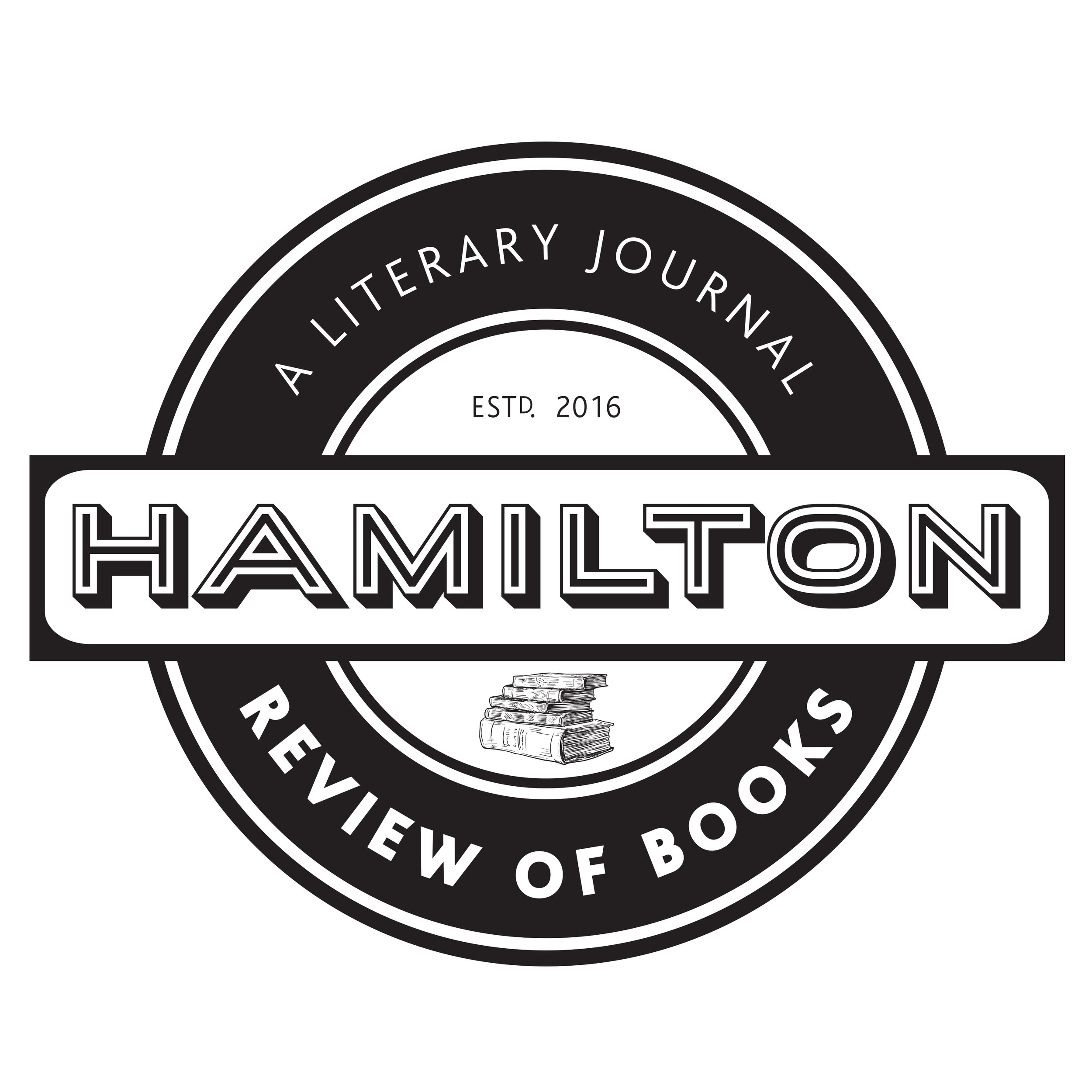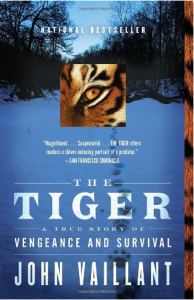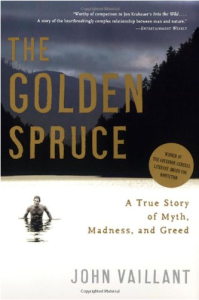If You're Going to Write a Mighty Book, You've Got to Choose a Mighty Theme:
Angie Abdou and Manijeh Mannani In Conversation with John Valiant
Photo credit: John Sinal
John Vaillant is an award winning nonfiction writer, novelist, and journalist. His work has appeared in The New Yorker, Outside Magazine, and National Geographic. John’s books have won the Governor General’s Award, The Writers’ Trust Nonfiction Prize, and British Columbia’s National Award for Nonfiction. Athabasca University was pleased to have John as its 2016-2017 Writer in Residence. Recently, Angie Abdou and Manijeh Mannani, from Athabasa University’s English Department, had a chance to interview John about his work. Below is a transcript of that conversation.
John Vaillant. The Jaguar's Children. Vintage Canada. $21.00, 288 pp., ISBN: 9780307397171
Angie Abdou/Manijeh Mannani: You were born and raised in the United States before moving to Canada where your writing career took off. You have taught at Canadian universities, held writer-in-residence positions at various Canadian institutions, and been featured at all the major Canadian writing festivals. Despite your active involvement in the Canadian literary scene, do you think there are ways in which your American upbringing differentiates your work from that of your Canadian peers in terms of aesthetics or ideology?
John Vaillant: Yes, being a New Englander has marked me. Growing up in Cambridge, Massachusetts (and being in the academic ferment that my family was in there), there was not even just an expectation but an assumption of excellence. You wouldn’t bother doing something unless it was going to be really good. There wasn’t a lot of forgiveness if it wasn’t.
There is this really beautiful intellectual literary tradition in New England, too: Melville, Thoreau, Dickinson, and Emerson. Literary excellence is very present. So there’s a deep appreciation for writing, certainly in the environment in which I grew up. My grandfather had every issue of The New Yorker bound back to 1925. It’s one of the first folding things I opened. That makes a difference: having literary excellence be a value that my parents admired. Both of them wrote well, too; it’s a family trade. What’s responsible for my role as a writer? Was it New England, United States, my family, the powerful influence of Canada? I’d say they all blend together, nature and nurture.
Also, as far as writing about Canada, I’m an outsider. I don’t take anything for granted. It’s all new to me. That outsider status shaped the way I saw the golden spruce. I saw it anew, where so many others just saw a mentally ill guy and a bunch of trees. It turned out that burrowing under the surface of a bunch of trees and a mentally ill guy, I got to some really meaty and universal themes. Being an outsider was an asset.
AA/MM: You began your writing career as a journalist and then published two very successful nonfiction books (The Golden Spruce and The Tiger) before turning your attention to fiction (The Jaguar’s Children). How does your fiction-writing process differ from your nonfiction one?
JV: Fiction is harder than nonfiction, certainly for me anyway. The nonfiction was practice for the fiction. With nonfiction, the story is already there. It’s more like painting by numbers. Of course, you still have to assemble the story, but the basic spine of it is there. You’re taking an intact fossil, unearthing it, standing it back up and bringing it back to life. But in fiction, you’re creating a whole new beast. There’s no fixed reference point. You can’t go back and check a newspaper article or ask somebody. It’s all on you. It’s a daunting responsibility.
I approach both forms intuitively, though. There’s an intuitive quality that informs my nonfiction, but it’s more pronounced in fiction because the whole thing is coming as a progressive vision. None of my books are planned out. Each one is a voyage of discovery — fiction only more so.
AA/MM: Like your nonfiction, your first novel is meticulously researched. NPR calls it “a beautiful example of how research can turn into a living piece of narrative.” How do you know when your research material will be best suited to nonfiction or when you’d rather have the freedom and flexibility of fiction?
JV: Based on my one single novel, the voice of Hector that came to me wasn’t an actual person. But that’s who I listened to. Regarding fiction, I still needed to do research or Hector wouldn’t have had credibility. That’s where fiction and nonfiction use the same tools, especially if the writer is trying to create something that feels real and is historically and culturally authentic.
AA/MM: You had started a second novel before the Fort McMurray fire caught your attention and drew you back to nonfiction. You dropped the novel to pursue your forthcoming book, Fire Weather. How do you decide which ideas are most worth your time (and what ideas are most likely to turn into books)?
JV: That’s a tricky one. There are a couple of criteria. One is: which idea is pulling you the hardest, keeping you up at night? And then you have to decide: why is it pulling you? Is it just because it would be easier to do than the other, riskier idea? I wondered if I should stay in the hard uncertainty of the novel, and if going back to nonfiction was a cowardly cop-out. But then, on the other hand, this huge fire and its impacts offered an amazing opportunity to get at some important issues of our time. So I had to decide if I was running away or running toward something. What answered that? My unconscious stepped in; I had a dream that clarified the themes of the nonfiction book. Then it really started to make sense. I started to write the proposal and it came easily, and I liked what I was writing. My agent liked it, too, and said you really have something here. So, all these signals, together, gave me confidence.
Melville said if you’re going to write a mighty book, you’ve got to choose a mighty theme. Fire is as mighty as a theme as they come. If I can’t make a story out of fire, what can I do? It’s an incredible subject, challenging in all the right ways.
Of course you have to take finances into consideration in these choices, too. Ultimately, it’s a decision to make between you, your muse and your accountant.
AA/MM: You have traveled widely to research your various books, recently spending weeks at a time in Fort McMurray, living away from your family. Do writers need to spend time in a place to write about it? What does a writer gain from that kind of immersion that can’t be gained from book or internet research?
JV: I wrote the proposal never having been to Fort McMurray, but people who read the proposal thought I had been there. I can fake it. A good reporter can. There was enough information out there that I was able to draw on details that felt intimate and authentic, because they were. But part of why one writes is because you feel like your perception and perspective are different than other people’s perception and perspective. Otherwise, what’s the point? And if you’re just going to say what others have already said, and already know, then why would anyone read you? So, ultimately, yes, you do have to go to the place because you don’t know what you’re going to see and how it’s going to strike you. I definitely saw things I never would have imagined, things that I really couldn’t have imagined. The time I’ve spent in Fort McMurray reconfirms for me that truth really is stranger than fiction, and nonfiction is an incredible, bottomless medium.
AA/MM: In an interview with AbeBooks.com (Beth Carswell), you indicate that the uniqueness of the subjects in The Golden Spruce and The Tiger drove you to write the books even though you had thought they had been “done.” What uniqueness has driven you to write about Fort McMurray Fire? The Fire and the broader question of the oil sands are "done," too. What inspired you to write about this topic?
JV: Because the forces at work in that fire were extraordinary and they have some very interesting precedents that nobody else has gotten into, and those forces have truly dire implications which other writers have touched on, but nobody I have read has really written about fire quite the way I want to do it. The fire in Tennessee was a big deal. The fire in Portugal was a big fire. A lot of people died in those fires. Nobody died in Fort McMurray, but the fire itself was much bigger and hotter. Everything about the story is big: boreal forest, biggest oil field, biggest evacuation, and one of the largest fires. Then, too, there is the fire’s role as a bellwether for the future of fire on this planet. By my criteria, a story has to have a lot of legs to stand on — it’s not just about a big fire, or the oil sands, or the huge evacuation. It’s all those things and more. A story needs at least three or four thematic legs. That’s what gives it energy and strength.
AA/MM: The recent fire in British Columbia, now your home province, is as devastating as the Fort McMurray Fire. Do you think it has changed the course of your writing about Fort McMurray Fire and the overall layout of the narrative?
JV: No, it’s a shame but it’s following the same pattern. It confirms what is already known.
AA/MM: In your second presentation during your term as Athabasca University's Writer-in-Residence, you talked about “unlearning what you know [and] the process of learning and unlearning” while researching Fort McMurray Fire (and the oil sands) and particularly after interviewing various stakeholders. You stated that your prejudices about the oil sands started to dismantle, as you started writing the book. How intense a challenge in writing has this change of perspective been?
JV: That’s the wonderful thing about writing. When I’m sitting around talking to you and my family, I have all my feelings and opinions. A lot of them are half-baked, emotional and ill-informed. That’s what friends are for. I tell you my theories and emotions, and you nod your head, maybe push back. A book, though, is for the record. I don’t write polemics. I try to get at a truth. For me, the real success will be if I’m invited to Fort McMurray, and people there buy the book and read it and resonate to it. If I can tell the story in a voice that they can hear and take in, then I’ve achieved psychological and spiritual truth as well as an intellectual one. As a writer, I’ve had to learn to leave my judgmental self at the door, and go in with a clean and open heart. Then, yes, once I do that, I can really take in and metabolize the visceral and life-changing experience of new perspectives.
Dr. Angie Abdou is an assistant professor of Creative Writing at Athabasca University. She has published four books of fiction, including The Bone Cage a 2011 Canada Reads finalist. Her most recent novel (Between) was a best of 2014 book in Vancouver Sun, Prism Magazine, and 49th Shelf. Her fifth book, a novel called In Case I Go, will be released in mid-September.
Dr. Manijeh Mannani is associate professor of English and Comparative Literature and associate dean in the Faculty of Humanities and Social Sciences at Athabasca University. Her areas of research expertise incorporate poetry, life-writing, and cultural studies. She has published extensively on these topics.






